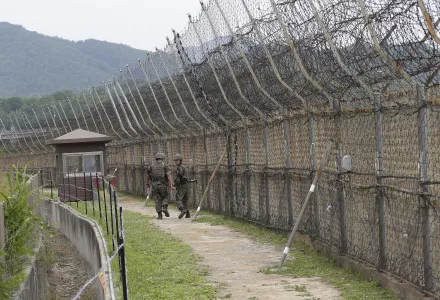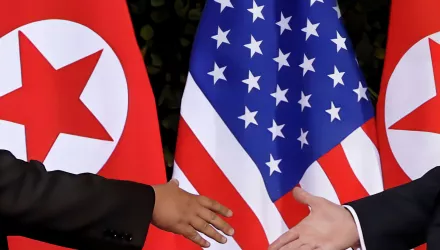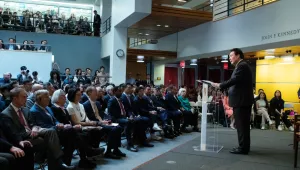
The Korean missile crisis in 2017 almost brought us to the brink of conflict on the Korean Peninsula. Although North Korea has not conducted an intercontinental ballistic missile (ICBM) or nuclear test since then, it continues to expand its nuclear weapons arsenal. In October, the Kim Jong Un regime unveiled a new larger ICBM in a military parade in Pyongyang. Experts believe it marks a major advancement in North Korea’s efforts to build capabilities that could overwhelm missile defense systems protecting the continental United States.
In the lead up to the 2020 presidential election, the Belfer Center’s Korea Project co-sponsored an event with the Consulate General of the Republic of Korea in Boston to explore the impact of the election outcome on North Korea policy. A group of diverse policy analysts drew on their collective experience serving in various administrations and conducting cutting-edge research on North Korea for a lively panel discussion. Panel members included Dr. Patrick Cronin (Asia-Pacific Security Chair, Hudson Institute), Jessica Lee (Senior Research Fellow, Quincy Institute for Responsible Statecraft), Mark Tokola (Vice President, Korea Economic Institute), and Jenny Town (Fellow and Deputy Director, 38 North, Stimson Center). Moderated by Dr. John Park (Director, Korea Project, Belfer Center), the panel members made the following key points in the discussion on a Biden victory:
Jenny Town stressed the importance of ramping up personnel as soon as possible to make sure that the new U.S. administration has a team in place that is knowledgeable and ready to act. She also recommended using one of the tools that President Trump employed to open up a diplomatic channel – sending a letter to Kim Jong Un “to help him understand what the U.S. policy is going to be, what the opportunities are, and not letting Kim guess. Because if he has to guess… Biden will be very similar to Obama and a policy of strategic patience is likely again.”
“They [Biden administration] should try to get ahead of North Korea [on messaging]...”
- Mark Tokola
Mark Tokola doubted that a Biden Administration would want to pick up the North Korea issue quickly. “They've got a lot of domestic things to worry about and there’s bigger fish to fry on the international stage too so I think they’re not going to be eager to engage. I think they should try to get ahead of North Korea [on messaging] rather than waiting for North Korea to do something that they have to react to.” If they could, he noted that it would be better to try to reset the diplomacy with North Korea in a realistic manner recognizing that a lot had changed since 2017.
Jessica Lee noted that experts who negotiated the Leap Day Deal during the Obama Administration may be back in a Biden Administration and would have a natural suspicion about negotiating with North Korea. She stated that “there are a lot of ways where this can become a back burner issue.” If a Biden Administration sought to signal the seriousness of an offer to negotiate, “it could declare the Korean War over. That’s not the same as signing a peace treaty... but this small step could be an educational moment for the American public who frankly don’t realize that we’re still technically at war. The Korean War is technically the longest endless war, not Iraq or Afghanistan... This is going to take political capital, courage, leadership, and prioritization and it remains to be seen if this is something that President Biden intends to do, but I think there will be public support if he chooses this path.”
Patrick Cronin shared Tokola's assessment that the first year of a Biden Administration “is going to be dealing with one domestic problem after another. He pointed out that it would be important to “get ahead of the diplomacy, not overreact to a provocation... Biden has to be prepared to not look weak but not to overreact to that kind of provocation so that he can eventually get to a more stable diplomatic set of engagements with North Korea in concert with our South Korean ally which I think a Biden Administration would have less of a problem doing.”
Town pointed out that she did not think “North Korea will let the U.S. put the issue [of negotiating] on the back burner.”
Click here for the full Webinar recording of this event.
Link to event info on Korea Project webpage here.
A full list of co-sponsored Korea Project events:
- “A New Approach to Nuclear Risk Reduction: Open Source Data Analysis” (November 13)
- Click here for event info
- “Chinese Open Source Analyses of North Korean Ballistic Missiles” (October 15)
- Click here for event info
- Click here for video
- “The Korean War: Revisiting the Role of Intelligence” (July 30)
- Click here for event info
- Click here for video
- “The Korean War: Revisiting its Impact on the Growth of the U.S. National Security Enterprise” (June 25)
- Click here for event info
- Click here for video
- “North Korea’s Healthcare System: How Effectively Can It Deal with COVID-19?” (June 18)
- Click here for event info
- Click here for video
- “KF-Harvard Belfer Center Virtual Dialogue: Reassessing Global Governance – What are the Geopolitical and Geoeconomic Implications of COVID-19?” (May 27)
- Click here for event info
- Click here for video
- “Looking in the Right Places: Using Non-Traditional Datasets to Study North Korea” (May 5)
- Click here for event info
Click here to return to Belfer Center Newsletter
"Implications of the 2020 Presidential Election on North Korea Policy." Belfer Center Newsletter, Belfer Center for Science and International Affairs, Harvard Kennedy School. (Fall 2020)




